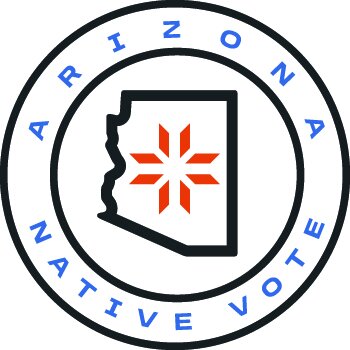Destinee’s Story: Why Culture Belongs in Every Civic Conversation”
“Voting and culture do go together—because it affects our way of life.” Destinee Watchman, a 24-year-old Diné woman from Lukachukai, Arizona, says this with quiet confidence. She recently graduated from Diné College with her bachelor’s in elementary education and completed her fellowship with Arizona Native Vote. For her, the connection between civic engagement and cultural survival is deeply personal—and it’s becoming more urgent with every election.
When asked what the word sacred means to her, Destinee doesn’t hesitate. “It means my identity, my roots, where I come from. It’s the teachings, the language, and the traditional practices that were instilled in me. This sense of sacredness isn’t abstract—it’s active. It’s something she protects through her actions, her choices, and yes, her vote.
A First Vote Without a Guide
Destinee first encountered civic engagement when she turned 18. She was getting her ID and was asked if she wanted to register to vote.“I remember asking my mom what a political party was,” she recalls. Without much guidance, Destinee had to navigate her first election on her own. She researched political parties, studied ballot measures, and made her best guess. “It was really different. I didn’t have anyone to ask. But I knew it was important, so I looked everything up myself.” It wasn’t until her fellowship with Arizona Native Vote that the process began to feel empowering. Through voter education booths and outreach events, she found clarity—and her voice.
Voting as a Cultural Responsibility
Destinee was never explicitly told that voting was part of her cultural responsibility. But over time, she came to understand the connection. “Voting affects our way of life. It helps us support policies that protect tribal sovereignty. Every vote is impactful—and it ensures that our voices are respected, and that our traditional values are represented.”
She saw firsthand how political decisions shape her community—especially during the debate over abortion rights in Arizona.
“I remember explaining that bill to my grandma before early voting. For her, abortion was taboo. But my roommate at the time was an advocate for women’s rights, and our conversations helped me see both perspectives. That’s something I really appreciated about working with Arizona Native Vote—it was nonpartisan. I got to hear both sides without judgment.”
Staying Grounded in Culture
Even while navigating the political world, Destinee has stayed close to her cultural identity—thanks in part to her education and the community around her. “I went to Diné College, so I was still in my community. We shared the same traditional values, and even in student leadership spaces or volunteer work, I always felt connected.” She shared how prayer is one of the most grounding practices she relies on. “During a meeting with the American Indian College Fund, someone asked how we stay close to our identity while away from home. For me, it’s prayer. It keeps you grounded.”
A Message to Native Youth
If she could speak directly to Native youth across the country, Destinee would tell them this: “You may be scared to go out into the world. I was. But learning who you are, what you stand for, where you come from, will help you find your voice. Once you find it, you’ll know how powerful it really is.”
Destinee’s story reminds us that civic engagement isn’t separate from Indigenous identity—it’s a continuation of it. Voting isn’t just about choosing leaders. It’s about protecting language, ceremony, land, and the generations yet to come.


